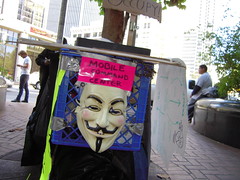November was a hard blogging month for me. I managed two posts: a single embedded TEDx talk (albeit one by Kaliya, who I respect greatly), and one about Thanksgiving.
I just didn’t have it in me. You see, I don’t love tech on its own; I love what it can do for people. More specifically, I love the ways the web empowers ordinary people with information and the power to be heard. It levels playing fields, democratizes markets and removes bottlenecks. Nobody gets to decide which music is released, which books are published or what news stories are reported any more. If a musician wants their song to get out, it will. If a witness at a protest wants to broadcast their shaky video of police officers in riot gear beating students unprompted or nonchalantly spraying tear gas into a line of nonviolent protesters, they can make that happen.
And they did. And they are. And they will again.
The Occupy camps I’ve been to have been shining examples of how to run a protest: well organized, intelligent, completely passive and filled to the stars with positive energy. I’m by no means a video professional, but I felt compelled to take some footage of Occupy San Francisco (please feel free to add your own Occupy video to that space), to record how beautiful it was. Entirely the opposite of angry or undirected, they even gladly welcomed people against the movement to speak their mind at their microphone.
Yet:
At first glance, it seems impossible that such a lovely gathering could be attracting so much anger and violence. But Naomi Wolf gets it perfectly:
The mainstream media was declaring continually “OWS has no message”. Frustrated, I simply asked them. […]
The No 1 agenda item: get the money out of politics. Most often cited was legislation to blunt the effect of the Citizens United ruling, which lets boundless sums enter the campaign process. No 2: reform the banking system to prevent fraud and manipulation [… and] correct the conditions for the recent crisis, as investment banks could not take risks for profit that create kale derivatives out of thin air, and wipe out the commercial and savings banks.
No 3 was the most clarifying: draft laws against the little-known loophole that currently allows members of Congress to pass legislation affecting Delaware-based corporations in which they themselves are investors.
When I saw this list – and especially the last agenda item – the scales fell from my eyes. Of course, these unarmed people would be having the shit kicked out of them.
Make no mistake: this has everything to do with the web, and the democratization of information. More than the startups, platforms, ubiquitous connectivity and access to incredible amounts of information, as a community we were disrupting the way people think about information and democratic power. Having disrupted publishing, the music industry and countless other incumbent models, the flow is finally reaching political power structures.
And it’s war.
The Stop Online Piracy Act ostensibly exists to help battle piracy – a serious problem, for sure, albeit one that in large part is of the content owners’ making. Unfortunately, the legislation allows websites to be removed without due process, restricts secure communications, and undermines whistleblowers. There’s understandably been a huge response against the Act from across the web – this site also ran a call to action – but it’s not dead yet.
More worrying still, the National Defense Authorization Act (which is renewed every year to maintain defense budgets) passed in the Senate yesterday with a new clause that allows suspected “domestic terrorists” – including US citizens – to be detained indefinitely without trial. In a world where someone can be investigated for terrorism and banned from airports for life over a tweet or added to the no-fly list for writing a book criticizing the President, this is deeply concerning. In a nation that prides itself on democracy and freedom, you can now be made to simply disappear.
As developers and evangelists, we have to make a decision. We all want to empower our users and make the world a better place, and usually we try to do this by making great products. But our success as an industry, and as individuals, has been a result of the context in which we’ve thrived. That context is being both directly and indirectly challenged, and we have to decide: are we going to carry on as before, or are we going to do something about it, ideologically stand with the people who are arguing for a more equal system, and build systems that truly, overtly empower?
Hopefully you’ll forgive me if I haven’t been as excited about the next big thing of late.


Leave a Reply